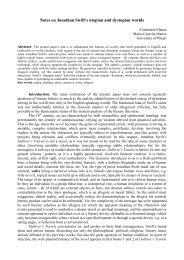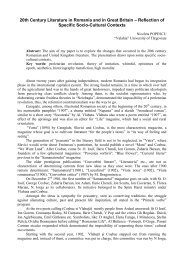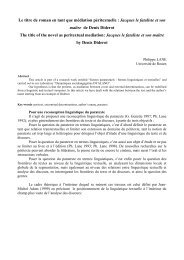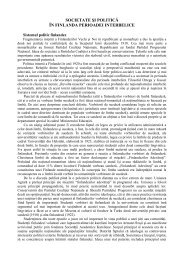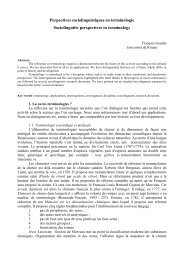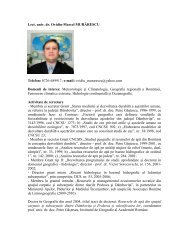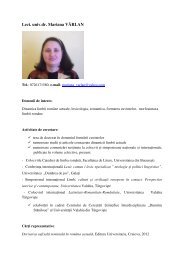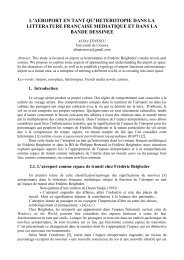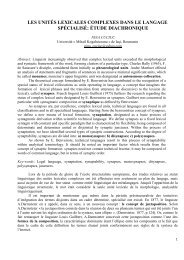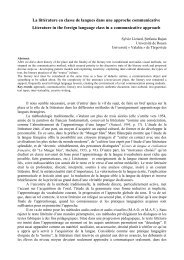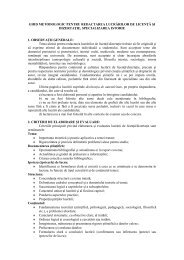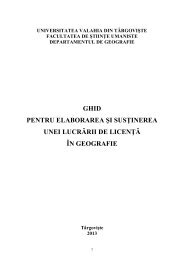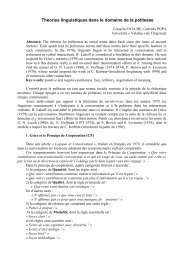THE ANNALS OF „VALAHIA” UNIVERSITY OF TÂRGOVIŞTE
THE ANNALS OF „VALAHIA” UNIVERSITY OF TÂRGOVIŞTE
THE ANNALS OF „VALAHIA” UNIVERSITY OF TÂRGOVIŞTE
Create successful ePaper yourself
Turn your PDF publications into a flip-book with our unique Google optimized e-Paper software.
44<br />
The Annals of „Valahia” University of Târgovişte<br />
time, he notices that on this definition 'it is hard to know what to call a politically<br />
oppositional discourse which promotes and seeks to legitimate the interests of a<br />
subordinate group or class by such devices as the 'naturalizing', universalizing and<br />
cloaking of its real interest.' (1991: 30)<br />
And finally, the sixth meaning of ideology, in Eagleton's perspective, 'retains<br />
an emphasis on false or deceptive beliefs but regards such beliefs as arising not<br />
from the interests of a dominant class but from the material structure of society as a<br />
whole. The term ideology remains pejorative, but a class-genetic account of it is<br />
avoided.' (ibid.)<br />
As far as the question of ideology 'as 'lived relations' rather than empirical<br />
representations' is concerned, Eagleton argues that, if this conception is true, it<br />
gives rise to important political consequences.<br />
In written media, social events are almost always tackled from an<br />
ideological position whether the author is doing this in a conscientious manner or<br />
not. Regardless of the different meanings of ideology, it is a fact that dominant<br />
social powers will always use 'ideology' and ideological beliefs to legitimate<br />
actions, to redirect interests, to call for measures, to proceed to social changes. A<br />
better understanding of the ideological discourse helps to unveil truths and<br />
strategies, thus getting closer to the 'circles of interests' and, by that, gaining<br />
perspective and looking at a bigger picture. Which is always profitable when<br />
analysing media discourse.<br />
References:<br />
[1] Brown, Gillian and George Yule (1983) Discourse Analysis, Cambridge: CUP<br />
[2] Cameron, Deborah (2001) Working with Spoken Discourse, London: Sage<br />
[3] Cox, R. W. (2004) Beyond Empire and Terror: Critical Reflections on the Political<br />
Economy of World Order, New Political Economy, 9(3): 307-323<br />
[4] Eagleton, Terry (1991) Ideology, London and New York: Verso<br />
[5] Fairclough, Norman (1992) Discourse and Social Change, Cambridge: Polity Press<br />
[6] Fairclough, Norman (2000) New Labour, New Language?, London and New York:<br />
Routledge<br />
[7] Richardson, John E. (2007) Analysing Newspapers. An Approach from Critical<br />
Discourse Analysis, New York: Palgrave Macmillan<br />
[8] Schiffrin, Deborah (1994) Approaches to Discourse. Oxford: Blackwell<br />
[9] Van Dijk, T. A. (1996) 'Discourse, power and access', in Carmen Rosa Caldas-<br />
Coulthard and Malcolm Coulthard, eds., pp.84-107<br />
[10] Woods, L. A. and Kroger, R. O. (2000) Doing Discourse Analysis: Methods for<br />
Studying action in Talk and Text. Thousand Oaks, CA: Sage




